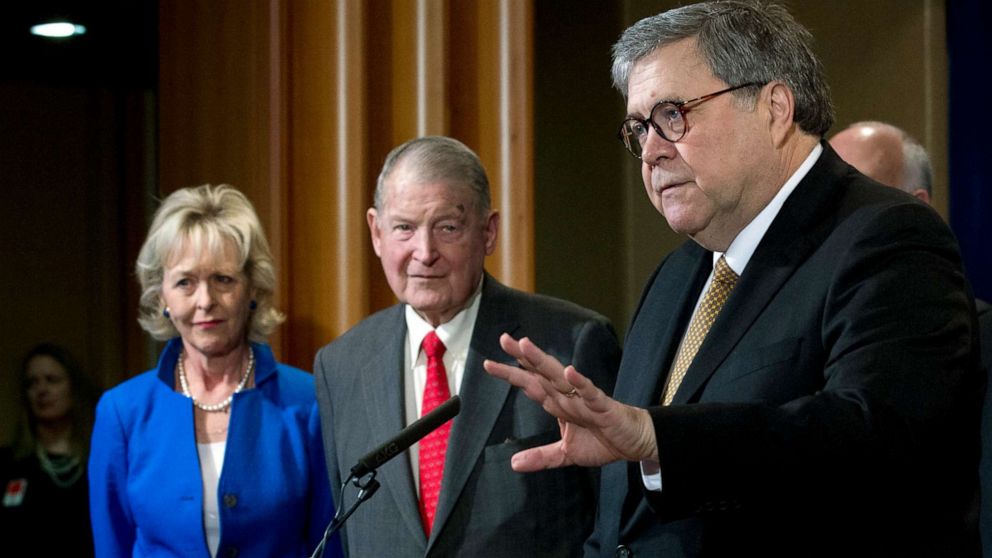Former FBI, CIA Director calls AG Barr's remarks about FBI 'troubling in the extreme'
Former FBI and CIA Director William Webster issued a surprising rebuke of President Donald Trump and Attorney General William Barr Monday over their reactions to the Department of Justice inspector general's report examining the origins of the Russia investigation.
Webster, who notes he is a "longtime friend" of Barr's, argued in a New York Times op-ed that both Trump and Barr's public statements attacking the FBI's actions in the investigation is "dangerous" for the bureau.
"Calling F.B.I. professionals “scum,” as the president did, is a slur against people who risk their lives to keep us safe," Webster wrote. "Mr. Barr’s charges of bias within the F.B.I., made without providing any evidence and in direct dispute of the findings of the nonpartisan inspector general, risk inflicting enduring damage on this critically important institution."

Webster was appointed FBI Director by former President Jimmy Carter and remained in the position through former President Ronald Reagan's tenure until Reagan appointed him as CIA Director.
"The privilege of being the only American in our history to serve as the director of both the F.B.I. and the C.I.A. gives me a unique perspective and a responsibility to speak out about a dire threat to the rule of law in the country I love," Webster said. "Order protects liberty, and liberty protects order. Today, the integrity of the institutions that protect our civil order are, tragically, under assault from too many people whose job it should be to protect them."
A spokesperson for the Justice Department declined comment when asked by ABC News about the editorial.
Webster in particular used the piece to mount a defense of FBI Director Christopher Wray, who in an interview with ABC following the IG report's release noted that despite major errors uncovered regarding the conduct of some FBI officials involved in the probe, "the investigation was opened with appropriate predication and authorization."
President Trump directly rebuked Wray's assessment in a tweet, saying, "with that kind of attitude, [Wray] will never be able to fix the FBI, which is badly broken despite having some of the greatest men & women working there!
Despite the president's misgivings about the FBI, however, internal numbers obtained by ABC News tell a different story about morale at the bureau.
According to the most recent FBI "climate" survey, morale internally was up for the first time in two years.
The survey, obtained by Lawfare through a FOIA lawsuit, asked FBI employees among other things, if they are proud to work for or are cynical of the bureau -- and if they have a high level of respect for FBI's senior executives. All of the questions were answered positively and showed an uptick in the bureau's morale from years past when it was on the decline.
The FBI has also seen an increase in applicants in the past year, according to an FBI spokesperson.
"I have complete confidence in Mr. Wray, and I know that the F.B.I. is not a broken institution," Webster wrote in response to the president. "It is a professional agency worthy of respect and support. The derision and aspersions are dangerous and unwarranted."
Webster's article is only the latest development in the political fallout from Inspector General Michael Horowitz's more than 400-page report examining the Russia investigation released just one week ago.
While Horowitz determined the investigation was opened based with proper predication and found no evidence of political bias, he was also highly critical of how agents handled the court-authorized surveillance of former Trump campaign adviser Carter Page.
"We identified significant inaccuracies and omissions in each of the four [FISA] applications," Horowitz said in testimony last Wednesday before the Senate Judiciary Committee. "Seven in the first application and a total of 17 by the final renewal application."
Horowitz added he could not rule out political bias was behind the mishandling of the surveillance process, he said he was not able to uncover evidence that spoke to the agents' motivations.
Barr in an interview said he believed Horowitz's non-determination "leaves open the possibility to infer bad faith" on the part of the FBI agents, which he said is what a separate ongoing investigation by U.S. attorney John Durham is looking to further explore.
Both Barr and Durham said they did not agree with one of Horowitz's key determinations that the Russia probe was launched with proper cause, a move that Webster took direct issue with.
"The country can ill afford to have a chief law enforcement officer dispute the Justice Department’s own independent inspector general’s report and claim that an F.B.I. investigation was based on 'a completely bogus narrative,'" Webster said. "In fact, the report conclusively found that the evidence to initiate the Russia investigation was unassailable."

The report's extensive documentation of alleged wrongdoing by some of the agents involved in the counter-intelligence probe of the Trump campaign, however, led former FBI Director James Comey to backtrack from past statements where he claimed the FISA process "was handled in a thoughtful and appropriate way."
"I was wrong," Comey said in an interview with Fox News Sunday. "I was overconfident as director in the procedures and it's important that a leader be accountable and transparent."
Initially, Comey had said the IG report's determination the Russia investigation amounted to complete "vindication" for himself and other FBI leaders excoriated by Trump over the past two years.
"It doesn't vindicate anyone at the FBI who touched this, including the leadership," Horowitz said Wednesday.
.




